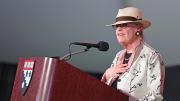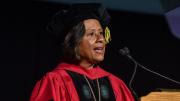At this year’s Harvard Graduate School of Education (HGSE) convocation, the message to graduates was both celebratory and sober. For those preparing to lead classrooms, shape education policy, and influence the next generation in schools and institutions of learning, Hobbs professor of cognition and education Catherine Snow delivered an urgent reminder: teach students how to argue, properly.
On May 28, addressing the Class of 2025, Snow warned that many of the values Harvard claims to uphold are no longer self-evident to much of the public, and that the University itself may have contributed to their erosion.
A major thrust of Snow’s speech focused on a familiar but increasingly fraught theme: argumentation is not a dirty word. Rather, she said, “argumentation is ultimately the process of embracing disparate propositions as opportunities to learn.” Snow reminded graduates—who have likely felt more wary of engaging in frank conversations in the past two years of campus protests—that an argument is not a paralyzing moral dilemma, in which one is caught between the competing demands of “making our own thinking clear” and “letting others make their thinking clear to us”; between “persuad[ing] people” and “understand[ing] them”; between “commitment to our own values” and “premature rejection of others’ values”; or between “disagreement and disagreeability.”
That ability to hold space for opposing views, Snow suggested, has gradually become a lost skill lost in both academia and society at large, where arguments are too often framed as zero-sum ideological fights. Too often, disagreement itself is seen as hostile, putting the habit of democratic deliberation at risk.
Snow referenced the two decades she has spent developing K–12 curricula to teach debate and argumentation (read more in “A Right Way to Read?” by Nina Pasquini, September-October 2024). These are skills that require not only “sophisticated oral language and literacy accomplishments” she says but, perhaps more importantly, respect: for facts and for one’s opponent.
She also spoke candidly about the rise of what she termed “performative actions”—institutional gestures such as pronoun declarations, anti-racist workshops, and diversity slogans. Snow argued that these actions have too often become symbolic stand-ins rather than substantive commitments. “Perhaps our focus on performative actions,” she said, “has masked the degree to which those performances represent, however inadequately, deep commitments to shared values—to an effort to create a world in which words like ‘marginalized’ and ‘minoritized’ are no longer necessary.” Her critique wasn’t of the gestures themselves but of a culture that allows their surface-level presentation to obscure the deeper values they’re meant to convey.
What has been lost, Snow argued, is the ability to articulate the foundational reasons why diversity matters—not for the sake of quotas or external optics, but because “the undeniable benefits of constituting a student body that is heterogeneous” are moral, intellectual, and civic. “A heterogeneous student body—diverse in nationality, language, ethnicity, and experience—is a profoundly important good in and of itself,” she continued. True diversity, she added, “is not about what someone identifies as, racially or ethnically. It is cognitive, moral, and democratic.”
Snow’s words come at a pivotal moment. Harvard is navigating a post-affirmative action landscape following the Supreme Court’s 2023 decision to ban race considerations in college admissions, as well as federal scrutiny of diversity, equity, and inclusion (DEI) programs and increasing political hostility toward elite institutions under the Trump administration.
The administration’s assault on Harvard has had a paradoxical effect. Snow referenced Crimson journalist Miles Herszenhorn’s coauthored article in the New York Times, which noted a surprising correlate of political attacks on Harvard, particularly by President Trump: a subtle re-coalescing of unity among students, even across ideological divides. One quote, from College sophomore and undergraduate co-president Abdullah Shahid Sial, stands out: “Wherever one falls on the Middle East conflict, everyone is on the side that cracking down on international students will not solve any of those issues.”
To ground her message, Snow looked back on the post-World War II period when she and her fellow baby boomers were educated (a cohort she referred to as a “multiply-blessed generation”). Snow characterized this world, while deeply flawed, as animated by a shared sense of possibility. “Sexist policies and attitudes persisted unquestioned. Racism and antisemitism were tolerated. Poverty continued, as did severe inequities in access to good schools, to decent health care, and to safe employment,” she acknowledged. Yet amid those realities was a “general sense of optimism” that progress was not only possible but underway, and that education was an essential ingredient.
That belief, she noted, wasn’t unique to the United States. Western European countries, aided by the Marshall Plan and social welfare reforms, heavily invested in public schooling. In China, a pivot toward a mixed economy in the late 1970s helped fund universal early childhood education and university expansion. In Vietnam, a national literacy initiative helped cut poverty from 80 percent in 1990 to 8 percent by 2018. Even in Latin America, where economic conditions have often been volatile, educational reforms helped drive long-term progress—efforts frequently shaped by HGSE graduates.
These global investments in education haven’t just lifted nations; they’ve reshaped Harvard. Today’s student body draws from every continent, bringing with it an array of perspectives that enrich the academic community. Snow framed this global diversity not as an accidental byproduct of globalization, but as a moral and intellectual imperative—with her address taking place less than 24 hours before U.S. District Judge Allison Burroughs blocked the Trump administration’s efforts to bar the University from enrolling international students.
In comparing her own coming-of-age in the 1970s to the present, Snow underscored a cultural loss she sees as more dangerous than “tariff-induced economic downturn or an unprecedented increase in the national debt”: the erosion of “a general presupposition of goodwill” that once allowed disagreements to be aired civilly.
Yes, she acknowledged, politicians of her generation “cheated and profited from their positions of power then as now,” but they “at least experienced embarrassment when they were caught in their lies” and acknowledged the importance of distinguishing truth from fantasy. Today, she warned, public discourse has descended into “widespread participation in fiction-reinforcement procedures.”
Even during the height of partisan conflict in the mid-twentieth century, she pointed out, Democrats and Republicans “ate lunch together and played squash together and attended each other’s birthday parties.” Likewise, she continued, “scientific misconduct existed, but it was not seen as an excuse to demolish entire structures focused on improving health or education outcomes”—a pointed remark in light of recent cuts to federal research funding and threats from the federal government to Harvard’s institutional autonomy.
In closing, Snow reminded graduates that their real work—the work of changing the world—begins now. “And note that it’s change the world,” she emphasized. “Not change the United States, not change Cambridge, not change Massachusetts. You are here because we need you, your skills, your commitment, your willingness to speak up, the knowledge you have brought with us from your own corners of the world, and your courageous candor if the world is going to change for the better.”









